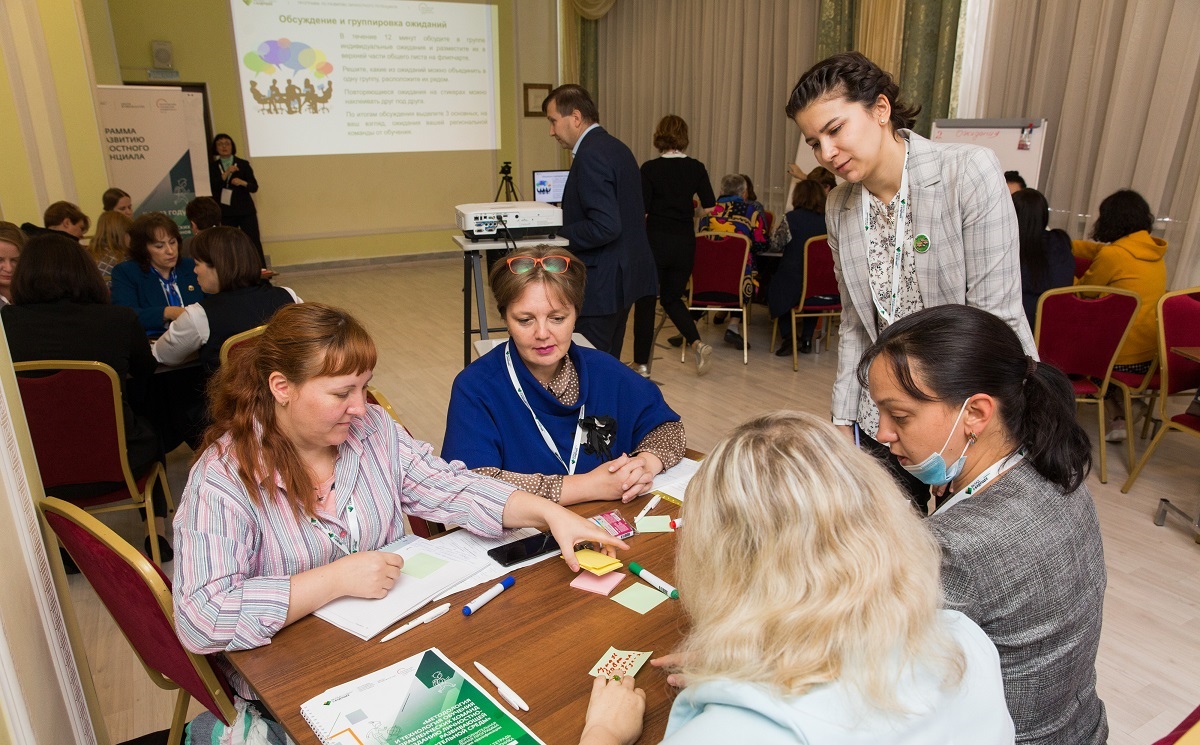Effects of the Programme
We bring to your attention the results of the first monitoring studies of the effects of the Personality Potential Development Program identified in educational organizations in 12 participating regions (experience in the Program at least 1 year).

Changes in managers and teachers
Studies in changes of the personality potential of managers and teachers were conducted in 2020-2021. Studies revealed an increase in the key characteristics of personality potential.
1. The growth of resilience of managers and teachers
2. Reduction of the mindset on the assignment and continuity of abilities (Fixed Mindset)
3. The growth of professional motivation, responsibility, self-efficacy, systematic reflection.
4. Among teachers the study showed a change in the style of pedagogical communication. In particular, the transition from dominance, detachment, and insistence from the teacher's side, that demotivate children, to support of children autonomy and competence, and taking into account the interests of the student.
177 managers and teachers took part in the study.
Changes in children
Within the framework of the research, stable interrelations have been revealed among the characteristics of the personality potential of teachers developed within the Program, and the results of children.
1. The interrelation was found among the formation of ‘reaching the goal’ skills, skills of working with others, emotional management in primary school students and aspects of the personality potential of their teachers: tolerance to uncertainty, ideological activity, responsibility, the life position of the individual, attitudes regarding the variability of intelligence and abilities, the styles of pedagogical communication used.
2. The correlation of high motivation of a teacher and a teenager was revealed.
The study involved 1,966 primary school students (900 first-graders and 1,066 second-graders) and 87 teachers from 52 schools, as well as 2,183 8th grade students from 60 schools in 11 regions of the presence of the Personality Potential Development Program.
The results of a comparative study of the students' competencies of ‘4K’, whose teachers were trained according to the Program, and students of the same schools whose teachers were not trained, indicate that the competencies of 4K are significantly higher in students whose teachers were trained according to the Program. At the same time, the gap in results increases between the experimental and control group from 4th to 8th grade, covering new competencies.
In 5th grades (400 students in the control group and 150 in the experimental group), the students of the teachers of the Program have a stronger ability to formulate their own conclusion (a component of the competence of Critical thinking) compared to students whose teachers were not trained.
In 7th grades (800 students in the control group and 300 in the experimental group), students of classes whose teachers were trained according to the Program show higher results in the competencies of critical thinking, communication and cooperation compared to students whose teachers were not trained.
In 8th grades (250 in the control group and 70 in the experimental group), students whose teachers were trained showed higher results in all four competencies — critical thinking, creativity, communication and cooperation - compared to students whose teachers were not trained.
Changes in the educational environment
According to the results of 1 year participation in the Program of educational organizations, there is shown an increase in the share of the creative environment by almost 8 points due to the dogmatic and career, as well as an increase in all parameters of the personal development environment that positively affect the personal development of students: breadth, security, mobility, awareness, emotionality, etc.
The study involved 17 educational organizations of the Kaluga and Yaroslavl regions, 9 educational organizations of the Khanty-Mansiysk Autonomic Region, 8 educational organizations of the Kaliningrad region, 9 educational organizations of the Altai Region and 12 educational organizations of the Lipetsk Region (2020-2021).